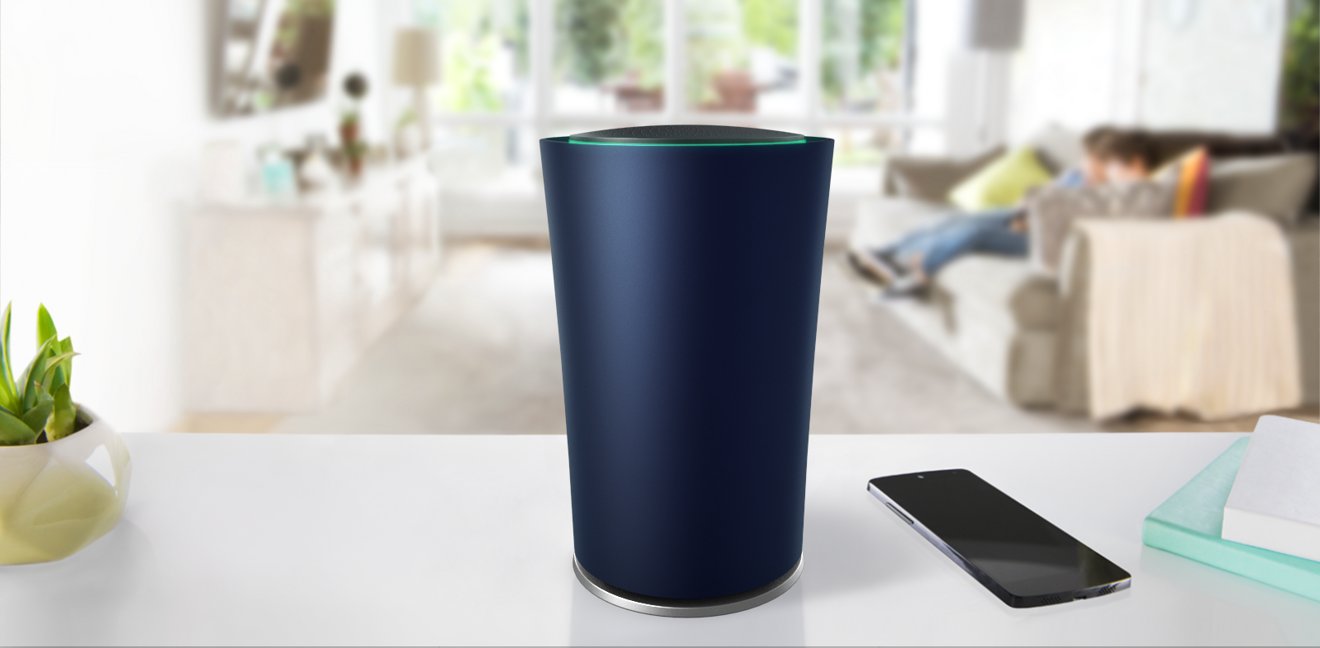Google on Tuesday launched preorders for the OnHub, a new 802.11ac Wi-Fi router it hopes will simplify wireless connections and will also act as a hub for smart home appliances. But the company also acknowledged that its Project Ara modular smartphone won't reach the public until at least 2016.
The OnHub — built in partnership with router maker TP-LINK — employs an unusual cylindrical design, hiding 13 antennas inside its frame. It also replaces a router's standard set of LEDs with a single ring light that shows one of four colors to indicate device status.
The device supports speeds up to 1.9 gigabits per second, and can operate on 2.4 and 5 gigahertz frequencies. The best channel is selected automatically during setup, and the router's software will continually adjust settings to try to avoid interference. If needed, connected devices can be prioritized to maximize their bandwidth.
Setup and management is handled almost entirely through an app for iOS and Android, Google On. The tool monitors network traffic, performs tests, and will offer suggestions if it detects a problem. It also displays a router's password "with a single tap," according to Google, and makes it easy to share via text or email.
The router has 4 gigabytes of onboard storage and is set to automatically update with new features and security patches. It's also said to be future-proof in terms of standards, being compatible with Weave, 802.15.4, and Bluetooth Smart Ready.
And in an addition that pits it against the Apple TV, OnHub will also control smart home devices that support Bluetooth Smart Ready, Google's Weave, or the 802.15.4 standard. The Apple TV, meanwhile, wirelessly controls HomeKit compatible accessories when a user is away from home.
The OnHub can be preordered for $200, either directly from Google or from other online sources like Amazon. Google said it is working on more OnHub devices with other manufacturers, including one from ASUS that should be announced later this year.
Project Ara
Via the official Project Ara Twitter feed, Google acknolwedged that it has scuttled plans to test the phone in Puerto Rico in 2015. The company is now "looking at a few locations in the U.S." for 2016, although last week it suggested that it's not abandoning Puerto Rico entirely.
The Ara concept would allow smartphone owners to upgrade individual components of their device, rather than having to pay hundreds of dollars to replace everything. Although Google showed off a working prototype at its May Google I/O conference, no commercial products have been announced.
In its most recent tweet, the Ara team explained that the delay is attributable to needing "lots of iterations...more than we thought."
 Roger Fingas
Roger Fingas








-m.jpg)






 Christine McKee
Christine McKee
 Malcolm Owen
Malcolm Owen

 Sponsored Content
Sponsored Content

 Amber Neely
Amber Neely











64 Comments
Given it's Google, I wonder if the OnHub sends data back to Google of what websites you access :-)
[quote name="PJWilkin" url="/t/187769/google-launches-onhub-wi-fi-router-delays-ara-modular-phone-tests-to-2016#post_2762930"]Given it's Google, I wonder if the OnHub sends data back to Google of what websites you access :-) [/quote] No it does not. There's a page with an FAQ that answers that particular question among others.
is Ara the new Giggle Driverless-Car? should have been out years ago.
And I trust Google to tell me the truth in that page because.....?
Seeing as Google said they would not use Nest information for advertising, only to apply to the FCC for the right to use connected home devices such as Nest for advertising purposes, I somehow imagine that despite them saying they won't use the information from this router, they either secretly or publicly will at some point, albeit well after they have been adopted broadly.